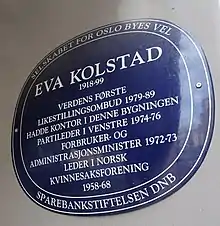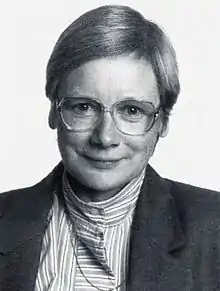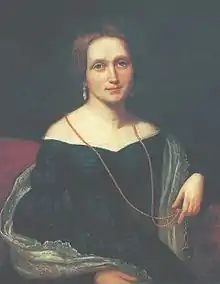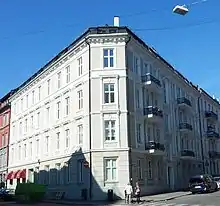Norwegian Association for Women's Rights
The Norwegian Association for Women's Rights (Norwegian: Norsk Kvinnesaksforening; NKF) is a Norwegian nonpartisan political advocacy organisation and Norway's oldest and preeminent women's and girls' rights organisation. NKF works "to promote gender equality and women's and girls' human rights through political and legal reform within the framework of liberal democracy".[1] Traditionally liberal (or mainstream) feminist in orientation, its feminism has been described as Norwegian state feminism, and the association has had a central role in the adoption of most legislation and reforms related to gender equality in Norway since 1884.[1] NKF consists of a national-level association as well as regional chapters based in the larger cities.
 | |
| Formation | 28 June 1884 |
|---|---|
| Founders | Gina Krog and Hagbart Berner |
| Type | Political advocacy |
| Headquarters | Majorstuen, Oslo |
President | Anne Hege Grung |
| Affiliations | International Alliance of Women, Norwegian Women's Lobby, Forum for Women and Development |
| Website | kvinnesak |
NKF was founded in 1884 on the initiative of Gina Krog and Hagbart Berner by 171 prominent progressive women and men, including five Norwegian Prime Ministers. Its basic principle is that full and equal enjoyment of human rights is due to all women and girls, and it works to advance women's social, economic, and political situation in Norway as well as internationally. Originally associated with the then-dominant and governing Liberal Party, NKF is today broadly representative of the political spectrum from the centre-left to the centre-right. The association has always been Norway's most important liberal (or mainstream) feminist organisation and has successfully campaigned for women’s right to education, the right to vote, the right to work, the adoption of the 1978 Gender Equality Act, and the establishment of what is now the Gender Equality and Anti-Discrimination Ombud. In line with its roots in 19th century first-wave liberal feminism, political and legal reform remains its primary focus, and it has always concentrated on lobbying government bodies in a professional way. As a result of its focus on legal reform, the association has always attracted many lawyers and other academics. NKF members had key roles in developing the government apparatus and legislation related to gender equality in Norway; during the 1970s, the "Norwegian government adopted NKF's [equality] ideology as its own",[2] and NKF's feminist tradition has been described as Norway's state feminism—a term coined by NKF member Helga Hernes—due to the governmental support it enjoyed. Starting with the presidency of Eva Kolstad, from 1956, NKF focused strongly on the United Nations, and NKF members have been appointed to key UN bodies including UNCSW and the CEDAW Committee; the CEDAW convention remains an important focus of NKF.
In 2020, Professor Anne Hege Grung was elected President in succession to Supreme Court Justice Karin M. Bruzelius. NKF is a member of the International Alliance of Women (IAW), which has general consultative status to the United Nations Economic and Social Council and participatory status with the Council of Europe. NKF is also a member of the Norwegian Women's Lobby and of the Forum for Women and Development, and NKF initiated the establishment of both organisations. In 1896, NKF also founded the Norwegian Women's Public Health Association, a humanitarian organisation whose membership reached 250,000. Several of NKF's early leaders, among them the noted humanitarian Fredrikke Marie Qvam, were married to Norwegian prime ministers. Its postwar leaders include Liberal Party leader and cabinet minister Eva Kolstad and the former chairman of UNICEF, Torild Skard. Its honorary members include Camilla Collett and Norway's first female Prime Minister Gro Harlem Brundtland. NKF's offices are located at Majorstuen in Oslo. NKF has always been open to both women and men. NKF's logo is a stylized sunflower, adopted in 1894, based on the model of the liberal American suffrage movement.
History


The Norwegian Association for Women's Rights was founded in 1884 by 171 prominent Norwegians, led by the liberal politician and women's rights pioneer Gina Krog and liberal Member of Parliament and the first editor-in-chief of Dagbladet Hagbart Berner.
From its establishment, the organisation was strongly associated with the Liberal Party; its 171 founders included five Norwegian Prime Ministers, several leaders of the Liberal Party, and many liberal Members of Parliament, as well as the editors of the large liberal newspapers and public figures such as novelist Alexander Kielland. Three of the first Presidents of the organisation, Anna Stang, Randi Blehr, and Fredrikke Marie Qvam, were all wives of Norwegian Prime Ministers. Membership has always been open to both men and women. NKF grew out of overlapping milieus connected to the political elite and liberal media in Norway, particularly the feminist association Skuld that had been founded the previous years by the first women to pursue higher education in Norway, but also Læseforening for Kvinder (founded by Camilla Collett in 1874), Nissen's Girls' School, Kristiania Lærerindeforening, the influential political and cultural magazine Nyt Tidsskrift, and the liberal newspaper Dagbladet.[3]
Among the important causes that the NKF has campaigned for are women's suffrage (achieved in 1913), the right to work (in the 1930s), abolishment of the common taxing for spouses (the 1950s), right to equal schooling (the 1960s), the establishment of the Gender Equality Council (Norwegian: Likestillingsrådet) in 1972, the Gender Equality Ombud in 1978, and the adoption of the Gender Equality Act (1979). The government apparatus concerned with gender equality, including both the Gender Equality Council and the Gender Equality Ombud, were largely built by NKF members.
Key NKF members initiated the establishment of the National Association for Women's Suffrage and the Norwegian National Women's Council. NKF inherited the former's founding membership in the International Alliance of Women (IAW) in 1937.
The association also initiated the establishment of the Norwegian Women's Public Health Association (Norwegian: Norske Kvinners Sanitetsforening), a humanitarian organisation, which grew to become Norway's largest women's organisation with around 250,000 members at one point. Historically, NKF was the most important association of the Norwegian bourgeois (or liberal) women's movement (associated chiefly with the Liberal Party), in contrast to the labour women's movement (associated with the Labour Party), and was traditionally dominated by liberal women from the upper class.[4] With the increasing reformism of the Labour Party, many Labour politicians joined NKF from the 1930s and especially during the postwar era. Today, NKF is a nonpartisan organisation.
During the presidency of Eva Kolstad (1956–1968), NKF became strongly involved in international cooperation through the United Nations and contributed significantly to early UN gender equality policies, and Kolstad was elected as a member and vice chair of the United Nations Commission on the Status of Women in 1968, the year she stepped down as NKF President, after being nominated as the joint candidate of the Nordic governments. Kolstad later became a cabinet minister in Norway, the leader of the Liberal Party, and then the world's first Gender Equality Ombud. During the 1970s and 1980s, the lawyers Karin M. Bruzelius and Sigrun Hoel led the organisation. Bruzelius became the first woman to head a government ministry as Permanent Secretary in 1989 and later became a Supreme Court Justice. Hoel served as the deputy Gender Equality Ombud during Kolstad's tenure and as acting Gender Equality Ombud.
In the early 1980s, NKF was responsible for the government-funded information campaign "Women and the election". In the late 1980s, NKF initiated the TV-aksjonen campaign to raise funds for "Women in the Third World", and NKF co-founded the campaign's successor Forum for Women and Development in 1995. During the presidency of diplomat and psychologist Torild Skard (2006–2013), the former Chairman of UNICEF, NKF renewed its focus on the United Nations, and NKF initiated the establishment of the Norwegian Women's Lobby, the umbrella organisation of the Norwegian women's movement. Skard was succeeded as President by Professor Margunn Bjørnholt in 2013, by the Norwegian Parliament's First Vice President Marit Nybakk in 2016, by Supreme Court Justice Karin M. Bruzelius in 2018,[5] and by Professor Anne Hege Grung in 2020.
The organisation had its offices in Sehesteds gate 1 in Oslo for many years, and now has its offices in Majorstuveien 39 at Majorstuen in central Oslo.
Elisabeth Lønnå describes NKF by 1970 as "an almost dignified organisation" that had its "origins in the Liberal Party and had a liberal platform, centered on the main idea of equality for all citizens and based on the idea of fundamental human rights." Lønnå notes that NKF had long traditions, a clearly defined form of organisation, an established network and well formulated policies and principles, and that it spent most of its resources on lobbying government bodies in a professional way. While NKF was influenced by the second wave of feminism during the 1970s, it was the "only feminist organisation that was primarily based on the idea of gender equality." In contrast to the many new feminist organisations that sprung up in the 1970s but quickly lost most of their membership, NKF was strengthened in the 1980s.[6]
Although it grew out of 19th century progressive liberalism, NKF, like modern liberal feminism itself, is not limited to liberalism in a modern party-political sense, and NKF is non-partisan and broadly representative of the democratic political spectrum from the centre-left to the centre-right; its members tend to be affiliated with parties like the social-liberal Liberal Party, the social democratic Labour Party, the reformist socialist Socialist Left Party, the centrist Green Party, the liberal-conservative Conservative Party or the Centre Party. NKF seeks the centre ground and to speak for the majority of women, and has always sought broad political support among women and men for reforms aimed at improving women's rights, believing its nonpartisan approach is the most effective way to advocate for women's rights and obtain practical results. Norwegian supreme court justice and two-time NKF President Karin Maria Bruzelius has described NKF's liberal feminism as "a realistic, sober, practical feminism".[1]
Policies
NKF's main focus is women's political, legal and human rights. NKF works "to promote gender equality and women's and girls' human rights through political and legal reform within the framework of liberal democracy" and focuses on "eliminating attitudes, laws and regulations that are discriminatory towards women and girls and which prevent gender equality."[1][7] In particular NKF today focuses on the Convention on the Elimination of All Forms of Discrimination Against Women, on the prevention of violence against women, on women's rights and opportunities in education and working life, on representation of women in politics, and on bringing women's perspectives into foreign policy and international development.[1] NKF supports the ban on buying sexual services in Norway.[8]
Presidents

NKF's national-level presidents have been:
- Hagbart Berner 1884–1885
- Anna Stang 1885–1886
- Ragna Nielsen 1886–1888
- Anna Bugge 1888–1889
- Ragna Nielsen 1889–1895
- Randi Blehr 1895–1899
- Fredrikke Marie Qvam 1899–1903
- Randi Blehr 1903–1922
- Aadel Lampe 1922–1926
- Fredrikke Mørck 1926–1930
- Anna Hvoslef 1930–1935
- Kitty Bugge 1935–1936
- Margarete Bonnevie 1936–1946
- Dakky Kiær 1946–1952
- Ingerid Gjøstein Resi 1952–1955
- Marit Aarum 1955–1956
- Signe Swensson 1956
- Eva Kolstad 1956–1968
- Clara Ottesen 1968–1972
- Kari Skjønsberg 1972–1978
- Karin M. Bruzelius 1978–1984
- Sigrun Hoel 1984–1988
- Irene Bauer 1988–1990
- Siri Hangeland 1990–1992
- Bjørg Krane Bostad 1992–1994
- Kjellaug Pettersen 1994–1998
- Siri Hangeland 1998–2004
- Berit Kvæven 2004–2006
- Torild Skard 2006–2013
- Margunn Bjørnholt 2013–2016
- Marit Nybakk 2016–2018
- Karin M. Bruzelius 2018–2020
- Anne Hege Grung 2020–
NKF's awards
NKF's highest honour is its honorary membership, which was first awarded to Camilla Collett in 1884 and last awarded to Norway's first female Prime Minister Gro Harlem Brundtland in 2016. Since 2009 NKF also awards the Gina Krog Prize, named after its founder.
Honorary members

- Camilla Collett (1884)
- Aasta Hansteen (1904)
- Aadel Lampe (1926)
- Dorothea Schjoldager
- Fredrikke Mørck (1934)
- Katti Anker Møller (1939)
- Margarete Bonnevie (1946)
- Dakky Kiær (1954)
- Signe Swensson (1954)
- Eva Kolstad
- Ebba Haslund (1995)
- Berit Ås (2009)
- Torild Skard (2014)
- Gro Harlem Brundtland (2016)[9]
- Helga Hernes (2018)[10]
Gina Krog Prize
Since 2009, the association has awarded the Gina Krog Prize, named after its founder Gina Krog.
The prize has been awarded to
- Historians Ida Blom, Gro Hagemann, Elisabeth Lønnå, Aslaug Moksnes and Elisabeth Aasen (2009)
- Filmmaker Anja Breien (2010)
- Tove Smaadahl (2012)
- Kirsti Kolle Grøndahl (2014)
- Amal Aden (2016)
- Nancy Herz, Sofia Nesrine Srour and Amina Bile (2018)
- Anne Hellum (2020)
Logo
NKF's logo is a stylized sunflower. It was adopted in 1894 based on the model of the liberal American suffrage movement led by Elizabeth Cady Stanton and Susan B. Anthony from the 1860s; by the late 19th century the sunflower had become the main international symbol of women's suffrage. The logo was also used as the logo of NKF's journal Nylænde, edited by Gina Krog. NKF states that the sunflower represents the association's "roots in the first wave of feminism and our systematic work since 1884 to promote gender equality through constructive political reforms within the framework of liberal democracy."[11]
References
- "Hvem vi er". Norwegian Association for Women's Rights. Retrieved 2020-10-28.
- Lønnå (1996) p. 273
- Moksnes 1984 p. 33
- Lønnå (1996) p. 18
- Høyesterettsdommer ny leder i Norsk Kvinnesaksforening, Norwegian News Agency
- Elisabeth Lønnå: Stolthet og kvinnekamp: Norsk kvinnesaksforenings historie fra 1913 (pp. 228–229), Gyldendal Norsk Forlag, 1996, ISBN 8205244952
- "About us". Norwegian Association for Women's Rights. Retrieved 2020-10-24.
- "Behold sexkjøpsloven". Norwegian Association for Women's Rights. Retrieved 18 November 2020.
- "Gro Harlem Brundtland utnevnt til æresmedlem av Norsk Kvinnesaksforening". Norwegian Association for Women's Rights. 21 May 2016. Retrieved 21 May 2016.
- "Helga Hernes æresmedlem i NKF". Norwegian Association for Women's Rights. 12 June 2018. Retrieved 12 June 2018.
- Solsikken symboliserer våre røtter i den første bølgen av feminisme. Norwegian Association for Women's Rights
Literature
- Aslaug Moksnes. Likestilling eller særstilling? Norsk kvinnesaksforening 1884–1913, Gyldendal Norsk Forlag, 1984, 296 pages, ISBN 82-05-15356-6
- Elisabeth Lønnå: Stolthet og kvinnekamp: Norsk kvinnesaksforenings historie fra 1913, Gyldendal Norsk Forlag, 1996, 341 pages, ISBN 8205244952

